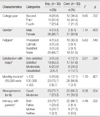Abstract
Purpose
The purpose of this study was to examine effects of enneagram group counseling program on self-identification and depression in nursing college students. Three groups, categorized by how the students solve their conflicts, were selected to identify changes from the program.
Methods
A quasi-experimental study with a non-equivalent control group and pre posttest design was used. Participants were assigned to the experimental group (n=30) or control group (n=33). The experimental group participated in enneagram group counseling program for 38 hours through eight sessions covering four different topics. Collected data were analyzed using Chi-square test, Fisher's exact test, t-test, and Wilcoxon signed rank test.
Results
Total self-identity score for the experimental group was significantly higher than the control group. However, there was no significant difference between the two groups for depression scores. The Assertive and Compliant groups demonstrated significant change in self-identification while the Withdrawn groups did not reveal any change.
Conclusion
Results indicate that the enneagram group counseling program is very effective in establishing positive self-identification for nursing college students who face developmental crisis and stressful situations. It is also expected that this program would be useful to enhance the students' confidence through a deeper understanding and acceptance of themselves.
Figures and Tables
References
1. Chon KK, Choi SC, Yang BC. Integrated adaptation of CES-D in Korea. Korean J Health Psychol. 2001; 6(1):59–76.
2. Faul F, Erdfelder E, Lang AG, Buchner A. G*Power 3: A flexible statistical power analysis program for the social, behavioral, and biomedical sciences. Behav Res Methods. 2007; 39(2):175–191.
3. Horney K. Our inner conflicts: A constructive theory of neurosis. New York, NY: W. W. Norton & Company, Inc;1945.
4. Kim EA, Park HK. The effects of enneagram group counseling for probation adolescents on their psychological adjustment. J Enneagr Stud. 2011; 8(2):231–267.
5. Kim GH, Kim HJ. The effect of therapeutic recreation program on the depression and self-esteem in nursing students. J Korean Acad Psychiatr Ment Health Nurs. 2006; 15(4):500–507.
6. Kim HJ. The effects of Enneagram group counseling programs on college students' self-identity and interpersonal relations. Korean J East West Mind Sci. 2008; 11(2):17–30.
7. Kim SI, Jung YC. The relationship between adolescents' depression tendency and their home environment. Stud Korean Youth. 2001; 12(1):5–27.
8. Kim SN. The effectiveness of enneagram group counseling program for the self-identification and the interpersonal relationship of nursing college students. Seoul: Ewha Womans University;2004. Unpublished master's thesis.
9. Kim YW. Enneagram. Seoul: Olive Tree;2007.
10. Koo HY. Effects of the enneagram group counseling program on self-esteem, anxiety and interpersonal relationships in nursing students. J Korean Acad Soc Nurs Educ. 2011; 17(3):446–455.
11. Lee HJ, Kim MH. A path model for self-identity and hopelessness to suicidal ideation of college students. Korean J Youth Stud. 2007; 14(3):243–264.
12. Lee JS, Kim YW. The enneagram program effect for stress management of college students. J Korean Acad Psychiatr Ment Health Nurs. 2004; 13(4):438–448.
13. Lee MR. The relationship among enneagram personality types, depression and anxiety of nursing students. J Enneagram Stud. 2007; 4(1):99–112.
14. Lee MR, Kim SG. A study on enneagram personality types of nursing students. Korean Parent Child Health J. 2005; 8(2):168–181.
15. Park AC. A study on the validity of the Korean versions of ego-identity scales. Korean J Educ Psychol. 1996; 10(3):67–83.
16. Park EM. Effects of personality education program for university students. J Korea Contents Assoc. 2012; 12(7):497–509. http://dx.doi.org/10.5392/JKCA.2012.12.07.497.
17. Park HJ, Jang IS. Stress, depression, coping styles and satisfaction of clinical practice in nursing students. J Korean Acad Soc Nurs Educ. 2010; 16(1):14–23.
18. Park HS. The Influence of ego-identity and depression on suicidal ideation for Korean adolescents. J Korean Acad Psychiatr Ment Health Nurs. 2007; 16(2):103–112.
19. Riso DR, Hudson R. Personality types using the enneagram for self-discovery. Boston, MA: Houghton Mifflin Company;1996.
20. Riso DR, Hudson R. The wisdom of the enneagram: The complete guide to psychological and spiritual growth for the nine personality types. 11th ed. New York, NY: Bantam;1999.
21. Ryu JJ, Choi MJ. A case study on art therapy using enneagram for hypochondria symptoms for women casualties of domestic violence. J Enneagr Stud. 2007; 4(2):29–68.
22. Timmins F, Corroon AM, Byrne G, Mooney B. The challenge of contemporary nurse education programmes. Perceived stressors of nursing students: mental health and related lifestyle issues. J Psychiatr Ment Health Nurs. 2011; 18(9):758–766. http://dx.doi.org/10.1111/j.1365-2850.2011.01780.x.
23. Woo JH. Enneagram personality test. Daegu: Chungam Suwon;1999.
24. Wright S, Sayre-Adams J. Who do you think you are? Nurs Stand. 2007; 21(32):20–23.
25. Yang SE. The relationship between ego-identity and depression in college students. Seoul: Sookmyung Women's University;1999. Unpublished master' thesis.
26. Yang SH. A study on the relationship between self-concept and the mental health of nursing students in junior college in some area. J Korean Acad Psychiatr Ment Health Nurs. 2001; 10(3):376–390.
27. Youn YS. The enneagram personality type scale: Its development and validation. Korean J Educ Psychol. 2001; 15(3):131–161.
28. Youn YS. The effect of enneagram training program related to self-identity and life satisfaction. Korean J Educ Psychol. 2002; 16(2):93–111.




 PDF
PDF ePub
ePub Citation
Citation Print
Print







 XML Download
XML Download